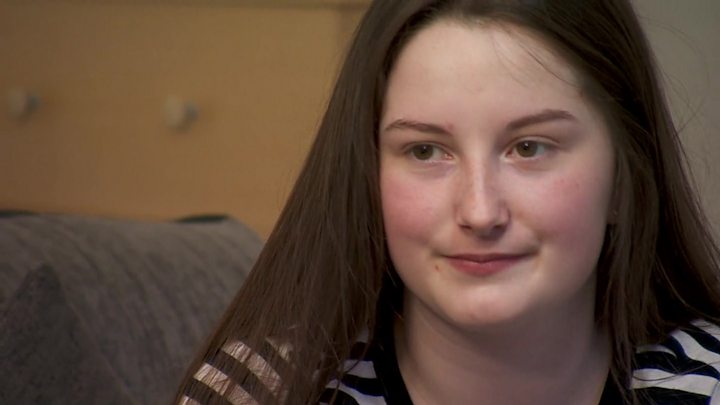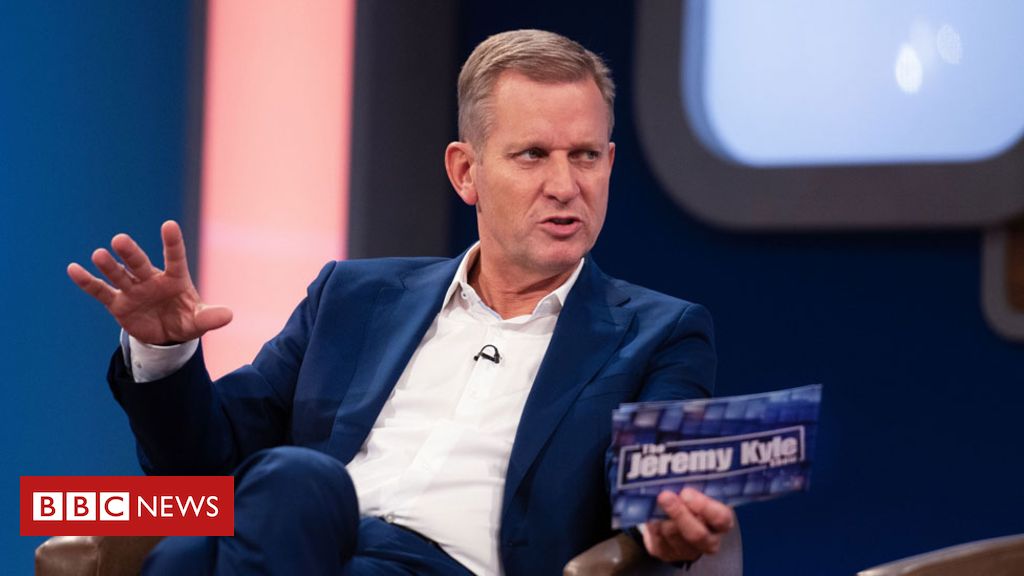 Image copyright
Image copyright
Shutterstock
About one million people watched The Jeremy Kyle Show every day
The Jeremy Kyle Show has been axed by ITV after the death of a guest who took part in the programme.
Steven Dymond was found dead on 9 May a week after filming the show, during which he took a lie detector test.
ITV’s chief executive, Carolyn McCall, said the decision was a result of the “gravity of recent events”.
The broadcaster had initially suspended filming of the show, which has broadcast more than 3,000 episodes since it began in 2005.
On Tuesday, the prime minister’s spokesman called Mr Dymond’s death “deeply concerning”.
ITV’s statement in full:
“Given the gravity of recent events we have decided to end production of The Jeremy Kyle Show,” McCall said.
“The Jeremy Kyle Show has had a loyal audience and has been made by a dedicated production team for 14 years, but now is the right time for the show to end.
“Everyone at ITV’s thoughts and sympathies are with the family and friends of Steve Dymond.”
The broadcaster added: “The previously announced review of the episode of the show is under way and will continue.
“ITV will continue to work with Jeremy Kyle on other projects.”
The pre-recorded episode Mr Dymond took part in was based on the subject of infidelity.
A member of the audience who was at the recording told BBC News that Mr Dymond “collapsed to the ground” and was “sobbing” when he failed the lie detector test.
Lie detectors were a regular fixture on the programme, which often featured disputes between partners and family members.
Critics said it put vulnerable people, often with issues of addiction and mental health, on a public platform – bringing them a level of exposure they may not have expected.

Media playback is unsupported on your device
The Jeremy Kyle Show, was the most popular programme in ITV’s daytime schedule, with an average of one million viewers and a 22% audience share.
On Tuesday, Charles Walker MP, a member of the all-party parliamentary group on suicide and self-harm prevention, told BBC News that Mr Dymond’s death was a “watershed moment”.
He said: “Societally, we have a responsibility for why this TV is made, it’s a reflection of ourselves that it has been made and so many people watch it.
“It’s cruel and there’s enough cruelty in the world without showing it on TV.”
Also on Tuesday, Sir Simon Wessely, who was president of the Royal College of Psychiatrists until 2017, described the show as “the theatre of cruelty”.
After Mr Dymond’s death, ITV suspended filming and took all planned episodes off the air, adding that the episode featuring Mr Dymond would never be screened.
A lot has changed in 24 hours.
Yesterday morning, ITV were minded to wait for the coroner’s verdict before deciding what to do with the show. In the past 24 hours, the evidence has grown that his appearance on the show had a devastating impact on Steve Dymond.
That evidence, and the fact that ITV is plastered across front pages once again, will have weighed heavily on the board’s mind.
The company’s director of television Kevin Lygo has tried to reinvent the broadcaster, and this programme was an anomaly within his offering: different in tone and editorial approach.
Nevertheless, it was a ratings hit, and much of its loyal audience will be despondent about it being pulled.
For all that, it’s vital to remember that this is ultimately an exceptionally sad story of a troubled individual who was found dead in his flat.
All previous episodes have been taken down from the channel’s catch-up service, ITV Hub. Episodes will not air on ITV2 either.
A spokeswoman for Portsmouth coroner’s office said an inquest into Mr Dymond’s death would be likely to be opened within the next few days, following the result of the post-mortem investigation.
Follow us on Facebook, on Twitter @BBCNewsEnts, or on Instagram at bbcnewsents. If you have a story suggestion email entertainment.news@bbc.co.uk.
